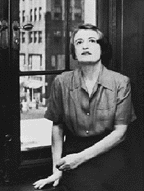
Ayn Rand

I think that Ayn Rand had some great ideas about indepedence, confidence, and what some would call selfishness.
Dagny Taggart, the main character in Atlas Shrugged, is an indepedent woman. She is strong, smart, and a leader.
| "Dagny, how
did you do it? How did you
manage to remain unmangled?"
"By holding to just one rule." "Which?" "To place nothing - nothing - above the verdict of my own mind." "You've taken some terrible beatings . . . maybe worse than I did . . . worse than any of us . . What held you through it?" "The knowledge that my life is the highest of values, too high to give up without a fight." |
I believe in what Dagny says with all of my heart. If one is spends their whole life giving to tothers, regardless of oneself, one becomes selfless.
Now, in her books, Ayn Rand came up with a new philosophy, objectivism.
"My philosophy, in
eseence, is the concept of man as a heroic being,
with his own happiness as the moral purpose of his
life, with production achievement as his noblest activity,
and reason as his only absolute."
-"About
the Author," Atlas Shrugged
Introducting Objectivism:
| Metaphysics: Objective Reality "Nature, to be commanded, must be obeyed." "Reality, the external world, exists independent of man's consciousness, independent of any observer's knowledge, beliefs, feelings, desires, or fears. This means that A is A, that facts are facts, that things are what they are-- and that the tasks of man's consciousness is to perceive reality, not to create or invent it." |
Epistemology: Reason "You can't eat your cake and have it too." "Man's reason is fully competent to know the facts of reality. Reason, the conceptual faculty, is the faculty that identifies and integrates the material provided by man's senses. Reason is man's only means of acquireing knowledge." |
| Ethics: Self-interest "Man is an end in himself." "Man-- every man-- is an end in himslef, not a means to the ends of others; he must live for his own sake, neither sacrificing himself to others nor sacrificing others to himself; he must work for his raitonal self-interest, with the achievement of his own happiness as the highest moral purpose of his life." |
Politics: Capitalism "Give me liberty or give me death." "The basic social priciple of the Objectivist ethics is that no man has the right to seek values form others by means of physical force--i.e., no man or group has the right to initiate the use of physical force against others. Men have the right to use force only in self-defense and only against those who initiate its use. Men must deal with one another as traders, giving value for value, by free, mutual consent to mutual benefit. Th only social system that bars physical foce from human realtionships is laissez-faire capitalism. Capitalism is a system based on the recognition of individual rights, including property rights, in which the only function of the government is to protect individual rights, i.e., to protect men from those who initiate the use of physical force." |
Ayn Rand believes that the world and reality exists in objective reality. What does that mean? This means that things exist in the outside world, apart from man's perception and experience. Man should try to know objectively, not merely subjectively, or with ideas/emotions.
Rand favors reason as the path to knowledge. A man senses something (sees, tastes, hears, feels) and then processes it through reason.
The self-interest part is pretty self-explanatory, as the capitalism.
So Helen, are you an
objectivist?
No.
Why?
I have several problems with objectivism.
* As aforementioned, Ayn Rand believes in an objective reality and that the only path to know objective reality is through reason. What is something in its objective state? It is a thing-it-itself. Now, as people, we can know the color of something, the taste, and we can use our brilliant mind to contrast-compare with others things; we can categorize. But we can never ever ever know something in itself. This means that, according to Ayn Rand, we can know nothing. Now, that is not true either. As Wittgenstein said, we can only know things subjectively (inside our minds). If philosophy is trying to know things objectively, it is OVER.
* Laissez-faire capitalism is no good. In Post WWI, they practiced laissez-faire (let it be - this means the government should have no control over the economy) and a DIRECT RESULT was the Great Depression of 1929-1942. In laissez-faire capitalism, the few with have all the money, and the many will suffer. This is what Ayn Rand believes is right. It is NOT. What will happen to the consumer-capitalist relationship? Dissolved. The many have NO MONEY TO spend! Henry Ford saw the problem with this - in the 1920's, he paid his workers MORE than other car manufacturers because then they, in turn, would buy his cars. Ayn Rand's little fairy tale land would not work in society.
In conclusion -
I do believe that reading Ayn Rand is a valuable experience. She is a great author and writer. She talks about relevant issues and keeps her readers enthralled in her stories.
I can say only this about her philosophy - it is not thought through well, it lacks the reason it preaches, and it does not consider the goal it wishes to attain. We can not know things objectively, we never ever ever will.
As a writer, Ayn Rand is extraordinary and I wholeheartedly recommend Atlas Shrugged.
Her philosophy, on the other hand, is optimistic, unrealistic, and basically, one big piece of trash.
To
learn more about objectivism and Ayn Rand -
Objectivism
- The Philosophy of Ayn Rand
or -